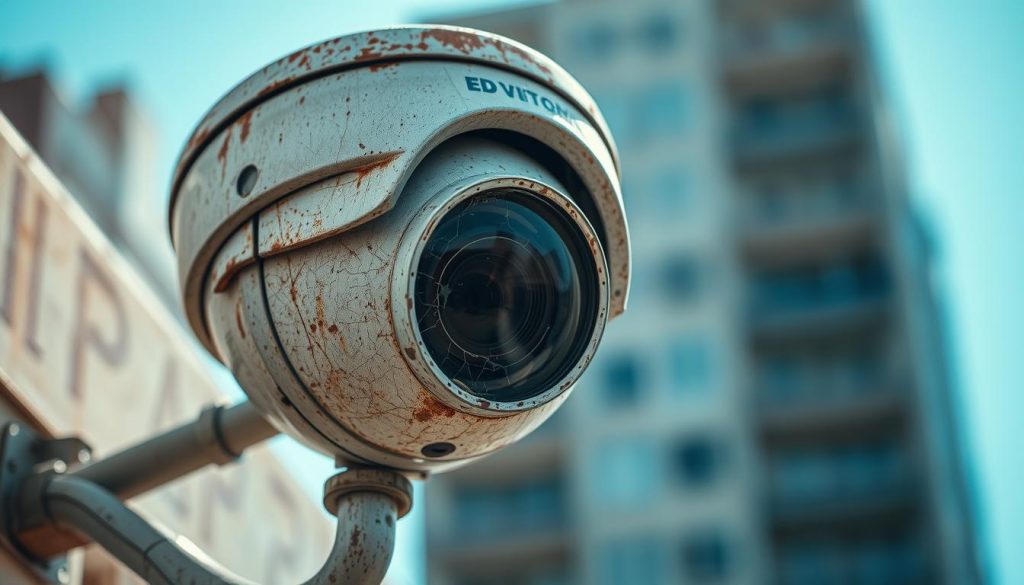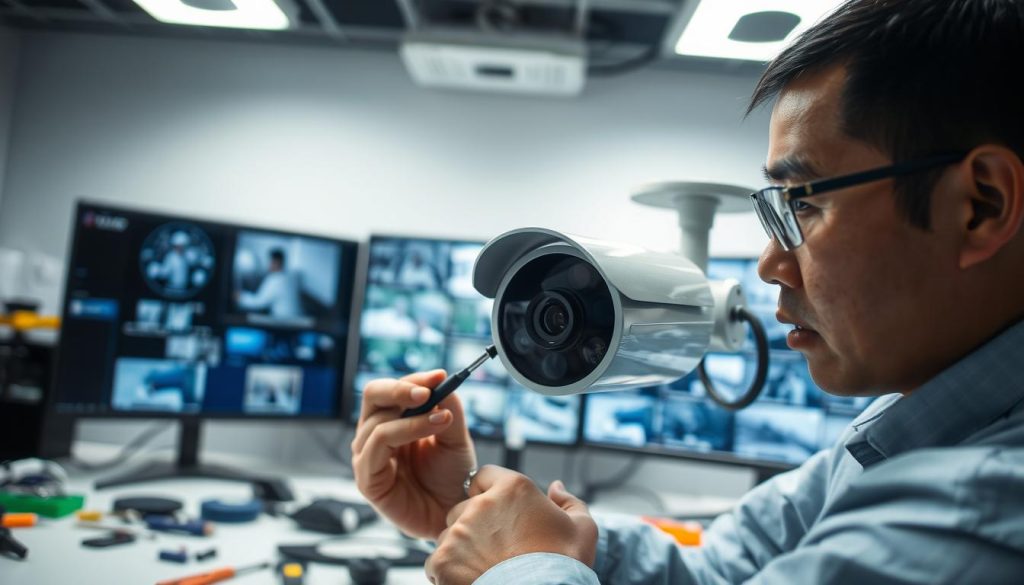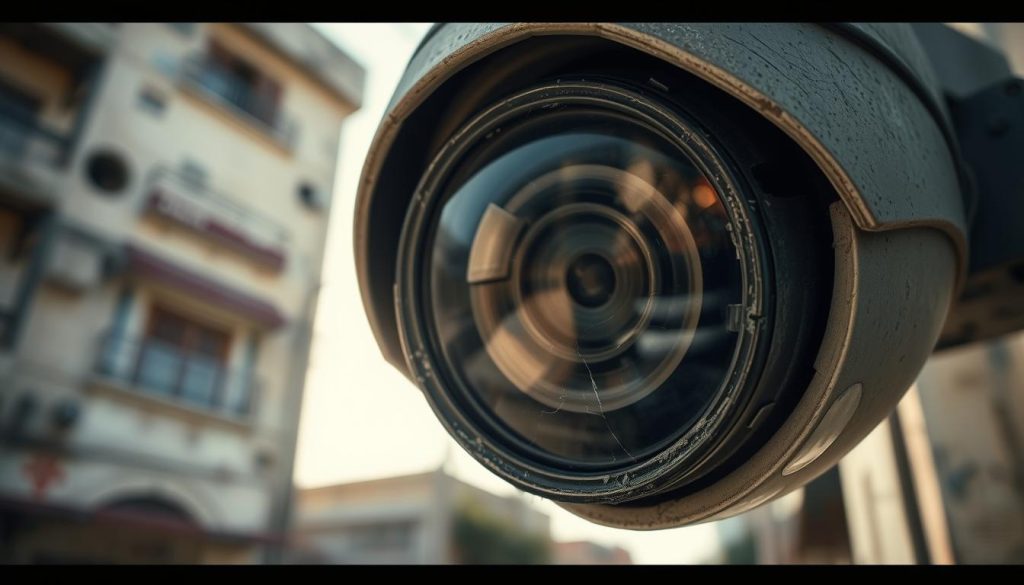Ever thought your security cameras might be losing their power, making your place less safe? It’s key to know if security cameras get worse over time. Knowing how long they last and how to keep them working is vital for strong surveillance.
Keeping them in good shape helps prevent damage and keeps your place safe. As tech gets better, using advanced solutions like IP CCTV can make your security better. With AI and cloud tech changing video watching, ignoring upkeep can leave you with old systems.
Staying ahead with maintenance and updates is important. This way, you can stop problems and keep your cameras working well.
To learn more about keeping your cameras safe and finding the right CCTV in Singapore, call ED Viston at +65 8313 4578. Find the top CCTV options made just for you!
Key Takeaways
- Security cameras have a limited life span due to many factors.
- Environmental conditions can make camera parts wear out faster.
- Regular upkeep is key to keeping cameras working at their best.
- AI is changing how we analyze video, making surveillance better.
- Cloud tech makes security systems more reliable and flexible.
Understanding Security Camera Lifespan
The lifespan of a security camera depends on many things. These include the camera’s type, quality, and where it’s used. Knowing how long a camera should last helps people choose the right one for their needs. On average, security cameras can last from 5 to 10 years. But, some top-quality ones might work for up to 25 years if taken care of well.
Common Lifespan Expectations
Different security cameras have different lifespans:
- Analog cameras usually last 5-10 years because they’re simple and have fewer parts.
- IP cameras often last 3-5 years because their electrical parts are more delicate.
- NVR and DVR devices can last 5-10 years, depending on how well they’re cared for and the environment.
- Commercial-grade cameras can last 5-10 years, and trail cameras might last 3-5 years, depending on their quality.
Factors Influencing Camera Lifespan
Several things can affect how long a camera lasts:
- Being exposed to extreme weather or high humidity can make a camera wear out faster.
- Cameras that run all the time might wear out quicker than those used less often.
- Cleaning and protecting your camera from harsh weather can make it last longer.
- Using the right technology, like firmware updates, and settings can also help a camera last longer.
- The materials and how well a camera is built are key to its lifespan.
Knowing these factors can help you get the most out of your camera. For the latest CCTV solutions, call ED Viston today at +65 8313 4578.
Do Security Cameras Degrade Over Time?
It’s important to know how long security cameras last and how well they work. Many things can make security cameras wear out faster. Signs of wear can tell you if your cameras are losing quality or working right.
Visible Signs of Deterioration
There are clear signs that your security cameras might not be working as well as they used to. A big sign is when the pictures become blurry or unclear. This can happen because of fog inside dome cameras, which means you might need a new dome.
Another problem is when cameras keep losing connection. This can happen because older cables get worn out. It’s a good idea to check your cables and connections often, as they might last longer than the cameras themselves, even indoors.
Impact of Environmental Conditions
The weather can really affect how long your security cameras last. Cameras outside face extreme weather, which can make them wear out faster. Moisture, dust, and changing temperatures can damage the inside parts of the cameras. Keeping the lenses clean and protecting the cameras from the weather can help them last longer. Running cameras all the time can also make them degrade faster in harsh weather. Knowing how the weather affects your cameras is key to keeping them working well.
If you want to make your security system last longer and work better, call ED Viston today. You can reach them at +65 8313 4578 to learn about the newest CCTV solutions and deals.
Surveillance Camera Deterioration Factors
It’s important to know what makes surveillance cameras wear out. The quality of materials and the type of technology used are key. These factors affect how long a camera lasts and how well it works.
Quality of Materials Used
The materials used in cameras greatly impact their lifespan. Cameras made with top-notch parts can handle tough weather better. They have casings that resist extreme conditions and lenses that stay flexible.
On the other hand, cameras made with cheap parts often struggle. They might get blurry images or work poorly in different lights.
Type of Surveillance Technology
The technology behind a camera also plays a big role. IP cameras, known for their clear digital images, don’t last as long as analog cameras. They usually last 3-5 years.
Analog cameras, with their simpler design, can last 5-10 years. Modern tech offers better features, but older tech might not keep up. Keeping up with new security tech is key to protecting your investment.
| Type of Camera | Expected Lifespan | Quality Indicators |
|---|---|---|
| Analog Cameras | 5-10 Years | Durable, fewer moving parts |
| IP Cameras | 3-5 Years | Digital video, sensitive components |
| High Dynamic Range Cameras | Varies | Optimal performance in various lighting |
| NVR/DVR Devices | 5-10 Years | Depend on maintenance |
Choosing quality and advanced tech is worth it in the long run. For better security in Singapore, contact ED Viston. Call them at +65 8313 4578 to see their latest CCTV options. Make sure your system stays top-notch.
Monitoring System Wear and Tear
Security cameras need regular checks to keep them working well. Over time, they can start to show signs of wear. It’s important to follow maintenance tips to keep them in top shape.
Conditions Leading to Wear
Several things can cause security cameras to wear out. These include:
- Environmental stressors like extreme weather can affect how they work.
- Physical damage from vandalism can cause problems.
- Lack of maintenance can lead to issues like blurry images and connectivity problems.
- Using outdated hardware can make them less efficient and may need to be updated.
The Importance of Regular Maintenance
Regular maintenance is key to keeping surveillance systems running smoothly. Important steps include:
- Scheduling routine inspections to catch and fix problems early.
- Cleaning lenses to keep images clear and avoid poor quality.
- Checking connections and updating firmware to avoid connectivity issues.
- Doing biannual checks on hardware, including batteries.
- Keeping an eye on storage space to avoid losing important footage.
By following these steps, you can spot small problems early. This helps avoid big repairs and keeps your system running smoothly. A well-maintained system means fewer gaps in monitoring and less chance of breaches.

For more information or help with your surveillance needs, call ED Viston today at +65 8313 4578. Learn about the latest CCTV solutions and offers.
Common Signs of Security Camera Degradation
It’s key to know the signs of security camera wear and tear to keep your surveillance top-notch. Spotting these signs early can save you from expensive fixes and keep your monitoring sharp. Look out for poor image quality, connectivity problems, and physical damage.
Poor Image Quality
Poor image quality is a clear sign of camera trouble. It can come from dust on the lens, cameras not set right, or night vision issues. Keeping your cameras clean and aligned can make your footage much clearer.
Intermittent Connectivity Issues
Security systems often face connectivity hiccups. These can be due to weak WiFi, old hardware, or devices that don’t work together. Cameras might lose signal because of obstacles or not enough bandwidth. Fixing these problems can make your system work better.
Physical Damage Indicators
Checking your cameras for physical damage is important. Look for signs of water damage or impacts. Cracks or loose connections can stop your cameras from working. Fixing these issues quickly can stop bigger problems.
For a detailed check-up and the latest CCTV tech, call ED Viston today at +65 8313 4578!
Security Camera Maintenance Tips
Keeping your security camera system in top shape is key. It ensures your cameras work well and last longer. Regular checks, cleanings, and updates can keep your system running smoothly.
Cleaning and Regular Inspections
Cleaning your camera lenses is a must. Dirt and dust can hurt image quality. Here are some tips for keeping your cameras in great shape:
- Make sure to clean your camera lenses often, but more so if they’re outside.
- Check the lighting around your cameras. Good lighting is essential for clear video.
- Regularly check your power supplies to avoid any issues that could stop your cameras from working.
- Use a CCTV Maintenance Checklist to keep track of all your camera’s needs.
Upgrading Old Equipment
It’s also important to update your equipment. Old systems might not have the latest features or performance. Here’s what you should do:
- Watch for signs that your system is getting old, like frequent problems or outdated tech.
- Check your hard drives for errors and make sure you have enough space for your videos.
- Keep your software up to date to ensure your system has the latest security and features.
- Replace parts like UPS batteries every few years to avoid system failures.

Having a good maintenance routine is vital for your security. It includes cleaning and updating your cameras. For more advice and the latest CCTV tech, call ED Viston at +65 8313 4578.
Camera Quality Deterioration: Causes and Solutions
Security cameras can lose quality for many reasons. It’s important to know why this happens to keep them working well. Dust on the lens is a big problem, making images blurry. Cleaning them regularly helps a lot. New technology can also improve camera quality and reliability.
Dust and Lens Obstruction
Dust can really mess with video quality. It settles on the lens and makes images fuzzy. Cleaning cameras often is key to avoiding this.
Outdoor cameras are more likely to get dirty. Spider webs and other stuff need to be cleaned off quickly. A regular cleaning routine helps keep images clear.
Technological Upgrades and Benefits
New technology makes cameras better. High-definition video and noise reduction are just a few examples. These features help keep images sharp.
Adjusting shutter speed also helps. Faster speeds are good for catching moving things. This is useful for things like reading license plates.
Choosing the right GAIN setting is important too. It helps avoid too much noise. Upgrading cameras means they last longer and work better.
| Camera Features | Impact on Quality | Maintenance Recommendations |
|---|---|---|
| Shutter Speed | Improves clarity for moving objects | Adjust for subject speed and type |
| Noise Reduction Settings | Affects clarity, can lead to ghosting | Test various levels for best results |
| Lens Cleaning | Prevents dust obstruction | Regular cleaning schedule required |
| Technological Upgrade | Enhances overall performance | Consider newer models for better functionality |
To explore the latest CCTV solutions and take advantage of the best offers, please contact ED Viston today at +65 8313 4578.
Camera Upgrade Recommendations
Upgrading your security cameras is key. Knowing when to do it is just as important. Look out for signs like poor image quality or if your cameras don’t work right all the time. These signs help you know when it’s time to upgrade.
Identifying When to Upgrade
There are several signs you need a new camera. Good cameras last five to ten years, but cheaper ones might only last three. Here are some clear signs it’s time for a new camera:
- Declining Image Quality: Older cameras usually have 720p resolution. Now, you can find cameras with 3 MP, 5 MP, and even 4K resolution.
- Technological Advancements: Surveillance tech has improved a lot. Keeping up with new features is important for good security.
- Environmental Impact: Cameras in harsh weather might not last as long. Indoor cameras usually do better.
Choosing the Right Camera for Future Needs
Picking the right camera is very important. Think about these things when you decide:
- Resolution Requirements: Go for modern IP cameras. They start at 2 MP to 3 MP, making images much clearer.
- Durability and Materials: Better cameras use stronger materials. This means they can handle tough conditions and last longer.
- System Compatibility: Make sure new cameras work well with your current security setup. This ensures you get the best protection and monitoring.
Choosing modern CCTV tech can really boost your security. If you’re thinking about upgrading or have specific needs, call ED Viston today at +65 8313 4578. They can tell you more about the latest CCTV solutions & offers.
Conclusion
It’s important to know if security cameras get worse over time. This is key for anyone thinking about getting surveillance tech. The importance of maintenance is huge; taking good care and checking them often can make them last longer. Things like where they are and what they’re made of really matter.
Keeping your cameras up to date is also vital. This stops them from becoming outdated because of new tech. Cleaning them and protecting them can make both old and new cameras last longer. This keeps them working well and avoids sudden problems.
To find out about the newest CCTV options, call ED Viston today at +65 8313 4578. See how today’s tech can boost your security.
Additional Resources
Keeping up with CCTV solutions and security updates is key for a good surveillance system. Businesses usually keep CCTV footage for 30 to 90 days. But, places like casinos and banks must keep it for six months or more because of laws.
Older CCTV footage can get worse over time. It can lose about 10% quality every decade. Yet, VHS tapes can keep footage clear for many years, helping to keep important moments safe.
How much storage you need depends on camera quality and technology. Digital cameras give much clearer pictures than old ones. IP cameras offer even better quality and add security with encryption and smart network features. They also make installation easier with fewer cables needed.
The design of your surveillance system can impact how you store and keep footage. A good CCTV system is custom-made to work best. For more information, call ED Viston at +65 8313 4578. They can help you find the best CCTV solutions and offers for your needs.
Customer Testimonials and Case Studies
Customers have shared their positive experiences with our advanced surveillance solutions. They are happy with the security systems we installed, which made their properties safer. Many have praised features like motion-activated recording and smart camera placement.
These features have greatly reduced break-ins, focusing on doors and windows. CCTV customer testimonials show how effective these solutions are.
Our security solutions case studies show the impact of smart surveillance. Clients have seen a big drop in unauthorized access with our outdoor cameras and anomaly detection. These features have scared off vandals and made places safer for everyone.
We invite you to explore how our solutions can fit your security needs. Call ED Viston at +65 8313 4578 to learn more about our CCTV services. Visit our website for more information on what we offer.
FAQ
Do security cameras degrade over time?
What is the typical lifespan of a security camera?
What are the visible signs that a surveillance camera is deteriorating?
How do environmental conditions impact camera longevity?
What factors influence the longevity of security cameras?
What conditions lead to wear and tear on security cameras?
What maintenance tips can help prolong the life of security cameras?
What causes camera quality deterioration?
When should I consider upgrading my security camera?
How can I choose the right camera for future needs?
Where can I find additional resources about CCTV solutions?
Source Links
- https://www.pelco.com/blog/cctv-and-video-security-camera-trends
- https://www.securitymagazine.com/articles/76910-its-degrading-its-not-delovely-1
- https://security.world/a-systematic-approach-for-troubleshooting-degraded-video-in-surveillance/
- https://reolink.com/blog/how-long-do-cameras-last/?srsltid=AfmBOopCpNf8vfeCs6_UionvMLEITmUUKx_U7OfniiBBFQnAcUDsWTRc
- https://mammothsecurity.com/blog/how-long-security-cameras-last
- https://reconeyez.com/us/security-camera-life-expectancy/
- https://www.a1securitycameras.com/blog/common-problems-with-security-camera-quality/?srsltid=AfmBOorD6bHg9ekWQ6HM20rYfUyHuWVMWilxPFFHG-tT23lmyUAaPqZa
- https://reolink.com/blog/how-long-do-cameras-last/?srsltid=AfmBOordQb-vDzH8T8u5JqF0d1GV8OI71xNGpy4ddUbmBuUidjbfcQkc
- https://solink.com/resources/industry-insights/why-are-security-cameras-so-low-quality/
- https://superresolution.co/causes-of-cctv-camera-quality-degradation-introduction/
- https://reolink.com/blog/how-long-do-cameras-last/?srsltid=AfmBOoocoq_X0F7quHmS-Jb7xqWZSH2HBQKxYICwxK2qjHYle0uD2ypA
- https://brinkshome.com/smartcenter/how-long-do-security-cameras-last
- https://www.linkedin.com/pulse/signs-your-security-camera-system-needs-maintenance-
- https://www.linkedin.com/pulse/importance-maintenance-security-cameras-ensuring-optimal-performance-cha2e?trk=public_post_main-feed-card_feed-article-content
- https://pacificsecuritygroup.com.au/blog/maintain-your-security-system/
- https://reolink.com/blog/video-loss-on-security-camera/?srsltid=AfmBOop8IbU-GNbnn5J9rmobAqAr6ri138Q945X4oH6yy9L3eGGt_5-W
- https://ipvm.com/discussions/strange-issue-keeps-damaging-cameras-help-needed
- https://datamyte.com/blogs/cctv-maintenance/
- https://programminginsider.com/security-camera-maintenance-tips-for-long-term-reliability/
- https://www.lorddecor.com/blog/understanding-the-lifespan-of-security-cameras-maintenance-tips-and-guidelines
- https://ipcamtalk.com/threads/common-issues-with-camera-image.45933/
- https://www.a1securitycameras.com/blog/common-problems-with-security-camera-quality/?srsltid=AfmBOopimcPSQqZGC0rVJSg5nPlhjM2Lm2g0zsgSKbSPZ0rqaIjfzomV
- https://www.cctvcameraworld.com/cctv-security-camera-image-problem/
- http://www.securitysa.com/55727n
- https://www.inspiredcctv-ne.co.uk/2024/09/20/what-is-the-lifespan-of-a-cctv-system/
- https://reolink.com/blog/how-long-do-cameras-last/?srsltid=AfmBOooVlva7gqEGpTTzgOq3eC32mOoqAPTug-vPwm0cCRUe-xILbiQ3
- https://cctvinstallation-losangeles.com/drawbacks-of-old-cctv-security-cameras/
- https://pro-vigil.com/blog/how-long-do-cameras-keep-footage/
- https://www.blackbox.be/en-be/page/23762/Resources/News-Events/news/analogue-cameras-vs-ip-cameras-a-12point-comparison
- https://www.bossecurity.com/2024/05/04/optimizing-your-security-strategic-placement-of-security-cameras/
- https://www.mdpi.com/2079-9292/12/17/3567
- https://marlowefireandsecurity.com/solutions/compliance/how-to-keep-security-cameras-working-in-the-winter/

